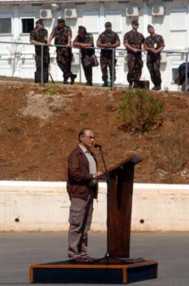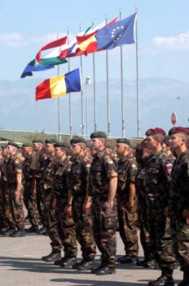A New Chapter In The Kosovo Commitment
Szöveg: Renáta Révész | 2008. szeptember 16. 8:02The peace of the Balkans has an impact on the whole of Europe, since this conflict area is the closest to the European Union. Since the beginning of the past century, Hungary has taken its share in preserving and maintaining the fragile peace in the Balkans. As regards the commitment of the Hungarian Defence Forces in Kosovo, a new chapter has started: a multinational KFOR battalion led by Hungarians has taken up service in its area of responsibility, at the base nearby the town of Pec, Kosovo.
Upon the initiation of the Minister of Defence, the President of the Republic of Hungary has presented the battalion starting its mission with unit colours and a decoration steamer, handed over by Imre Szekeres personally in Kosovo yesterday. The celebration was attended by the Slovene and the Hungarian Chief of Defence Staff, the leaders of the Hungarian Defence Forces, KFOR, and the local police force. More than 400 Hungarian troops have started their half year service in the HDF KFOR Battalion, which also includes Slovene troops, but is lead by Hungarians.
“The task is different, the location is different, but our aim is the same. To preserve peace, tranquillity, and to ensure the stability of the youngest European state," pointed out Defence Minister Imre Szekeres in his address in Pec, Kosovo. The minister referred to the Guard and Security Battalion stationed in Pristina, which has completed its service recently, however, the Hungarian Defence Forces are present in the area with an outstanding number of soldiers. “Our role in Afghanistan and Kosovo gives us an international reputation. We have a weight, and our word matters in NATO, in the European Union. This is your achievement. I expect the Hungarian soldiers serving in Pec to do their job in such a way that will strenghten our international reputation further," told the minister to the soldiers lining up.

In the conflict situation that arose in the Balkans in 1995, Hungary has supported NATO forces with the handover of bases in the homeland, and contributed to the ending of the war in the Balkans and the restoration of peace. The Hungarian Defence Forces contributed to the IFOR operations of NATO with an engineering contingent, which started its work in 1996. The unit was based in Croatian territory, in Okucani. In 1999, HDF Guard and Security Battalion started its operations, and the first troop rotation took place in the same year, with the core function of guarding and defending the headquarters of thee KFOR forces based in Pristina. The battalion has served 18 rotations in Kosovo, and recently the undertaking of Hungarians has been revaluated. HDF KFOR Battalion has been set up in the framework of this renewed undertaking, and started its operational tasks yesterday, that is on 1 September. In addition to Hungarian soldiers, there are also two Slovene companies taking part in the multinational battalion that has its own area of responsibility.
Key Events In Kosovo In The Last Few Months
In the afternoon of 17 September, 2008, the extraordinary session of the Assembly of Kosovo announced the independence of Kosovo and approved the new flag and coat of arms of the state. In February and March, Serbians and Kosovar Albanians organized demonstrations – the majority of which were peaceful – all over Kosovo. In the larger towns of the northern sector (Mitrovica, Gracanica, Gnjilane, Strpce) the demonstrations against independence continued, although with less and less intensity.
The ’Night of Fire’, a three-day remembrance event (5-7 March) held by Albanians concluded peacefully, in a tranquil atmosphere (on the 10th anniversary of the massacre of Adem Jahsari Uck and his family).
On 8 March, 2008, Vojislav Kostunica, the Head of Government of Serbia resigned. This act escalated into a government crisis.
On 11 May, 2008, Slobodan Samardzic, the Serbian minister responsible for Kosovo announced during his visit to several Kosovar settlements inhabited by Serbians that they are to hold elections in the areas inhabited by Kosovar Serbians as well.

At noon, on 15 June, 2008, in the parliament President Fatmir Sejdiu, Prime Minister Hasim Thaci, and Speaker of Parliament Jakup Krasniqi announced together that the constitution came into effect and the 41 bills, which – in accordance with the Ahtisaari plan – constitute a framework for the operations of the Republic of Kosovo, were enacted.
On 20 June, 2008, at the UN Security Council session Secretary Ban Ki-Moon outlined their proposals for the restructuring of UNMIK and the installation of the EULEX mission. In line with the proposals, UNMIK is to transfer its rights in the field of justice and law enforcement gradually, in 120 days, to the EULEX mission.
On 1 July, 2008, substantive work has started in the inter-governmental demarcation committee aiming to settle the border disputes between Kosovo and Macedonia.
On 16 July, 2008, the International Monetary Fund announced that it has received the application for admission to membership of the Republic of Kosovo.
On 21 July, 2008, President George W. Bush received Kosovar Head of State Fatmir Sejdiu and Prime Minister Hashim Thaci in his office. The arrest of Radovan Karadzic, the Bosnian Serb politician charged with genocide and war crimes, did not elicit reactions from the Kosovar Serbian community.
On 25 July, 2008, the UNSC discussed the subject of Kosovo, and Lamberto Zannier, the head of UNMIK also reported on the situation in Kosovo. Following the closing of the session, the SC is still divided, therefore no breakthrough is expected in the near future regarding the restructuring of UNMIK in Kosovo.